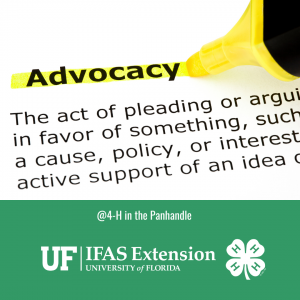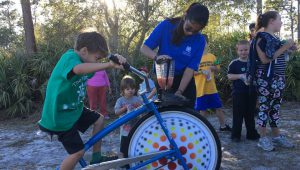 Citizenship, sometimes referred to as civic engagement, is a pillar of the 4-H program. A key part of guiding youth to develop as citizens is helping them to find and use their voice. One way to help youth in this discovery and skill building process is through learning advocacy. The simplest way to define advocacy is to think about it as being a process of defending or promoting a cause. When advocacy becomes linked with civic engagement, youth can become engaged in a powerful experiential learning process.
Citizenship, sometimes referred to as civic engagement, is a pillar of the 4-H program. A key part of guiding youth to develop as citizens is helping them to find and use their voice. One way to help youth in this discovery and skill building process is through learning advocacy. The simplest way to define advocacy is to think about it as being a process of defending or promoting a cause. When advocacy becomes linked with civic engagement, youth can become engaged in a powerful experiential learning process.
Advocacy Opportunities
4-H members have several opportunities to learn and apply advocacy skills in programs such as 4-H Day at the Capitol, 4-H Legislature, and the National 4-H Conference. However, advocacy can be an important part of the community club experience for all 4-H youth.
In 4-H, youth have opportunities to learn communication and leadership skills that can help them to become effective advocates for themselves and others. A community service project may involve an advocacy component. For example, youth in one county participated in a community clean up effort. The youth were assigned to clean a small park. While they were cleaning the park, they noticed that trash containers were not located in visible locations.
After the clean up project, youth discussed the park conditions at their next club meeting. The youth started discussing ways to improve the park and to help discourage littering. Their club leader introduced the SMART goals planning process to the club. The officers led the club members through the SMART process to develop a plan.
Putting SMART Goals to Work
Through the SMART planning process, the club took several important advocacy steps:
- Identified and researched an issue,
- Engaged in goal setting and planning,
- Reached out to decisionmakers,
- Presented information including possible solutions.
As a result of their experience, 4-H members learned how to address a community issue, ways to engage key decisionmakers, and saw their actions make an impact when county officials added trash containers in visible locations along with public signage.
Advocacy Learning Opportunities
Opportunities to have youth engage in hands on advocacy experiences may involve community problem-solving. Youth can also learn advocacy skills by working to raise awareness about issues. For example, February is American Heart Month. Youth can engage in advocacy about heart health in several ways:
- Wear red and encourage others to wear red to raise awareness about heart health.
- Set exercise goals such as a walking goal to help improve heart health and challenge others to join your effort.
- Promote heart healthy nutrition by asking local restaurants to feature a special healthy menu item during February.
- Ask the county commission or city council to issue a proclamation for American Heart Month.
American Heart Month is just one example of healthy living focused advocacy. Each month of the year has several associated health awareness campaigns. By choosing to advocate for better health, 4-H members can address two pillars at the same time: advocacy and healthy living. You can also tie this campaign into our 4-H Virtual 5K, which occurs every March and encourages youth and adults to walk or run.
Celebrate 4-H and Practice Advocacy Skills
National 4-H Week is celebrated every October and offers a great way for youth to develop advocacy skills by raising awareness about 4-H. Ideas may include but are not limited to writing letters to the local paper, securing a prominent spot to set up a 4-H exhibit, requesting a proclamation from local government officials, or engaging in a community service project.
Tips for a successful advocacy learning experience:
- Start planning early.
- Use SMART goal planning process.
- Remember to celebrate success and say thank you.
For more information about 4-H programs and additional advocacy resources, contact your local UF/IFAS Extension office.
Resources
4-H Project Learning
https://edis.ifas.ufl.edu/pdffiles/4H/4H34300.pdf
National Awareness Months
https://www.medicalnewstoday.com/articles/health-awareness-months#march
Strategies for Engaging and Communicating with Elected Officials
https://edis.ifas.ufl.edu/wc324
- All About Tabletop Exhibits for the North Florida Fair - September 10, 2024
- Beyond the Blue Ribbon: Make the Most of the 4-H Experience with Your Local Fair - July 5, 2024
- Tips to Help Youth and Families Handle Back-to-School Stress - July 28, 2023

